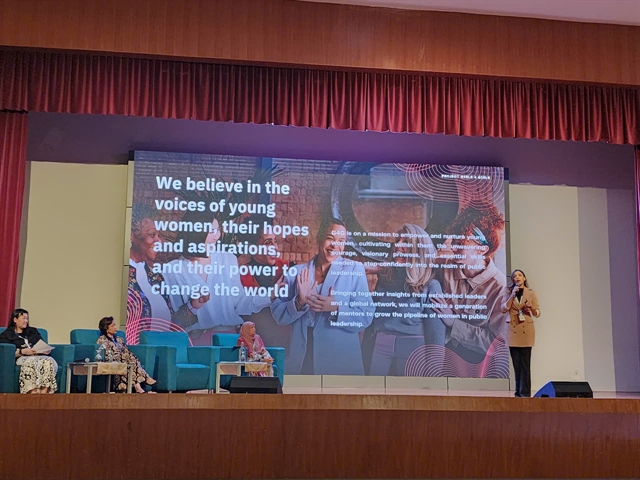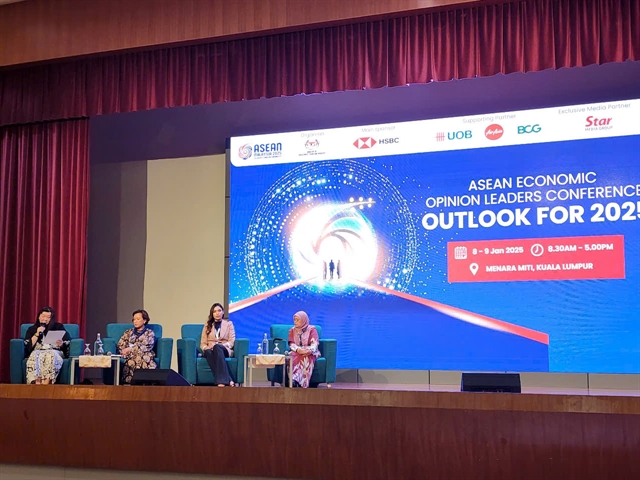 World
World

 |
| Panelists discuss about empowering women leadership in economic growth at the ASEAN Economic Opinion Leaders Conference which concluded on Thursday. — VNS Photo Ngọc Bích |
KUALA LUMPUR — How to ensure equitable growth across the ASEAN society, focusing on empowering women and fostering gender diversity in leadership roles was on top agenda of the ASEAN Economic Opinion Leaders Conference held in Kuala Lumpur on Thursday.
The panel discussion, led by the Star Media’s Chief Content Officer Data Paduta Esther Ng – the fourth woman editor in chief of the group, delved into the gender imbalance in the leadership roles across all sectors.
Talking about the imbalance structure in the healthcare sector, Prof. Dato Dr Adeeba Kamarulzaman, President & Pro Vice Chancellor of the Monash Univerity Malaysia said that a significant number of women are entering medical school, yet the profession presents challenges.
Women represent approximately 75 per cent of the global health workforce, primarily in nursing roles. However, they hold only about 3 per cent of the highest leadership positions within the health sector. This indicates a stark mismatch in representation and opportunities for women in healthcare leadership, Kamarulzaman noted.
In general, there is a significant conflict between the critical period for advancing from junior to senior roles and the simultaneous pressures of starting a family and caring for aging parents, she added.
“We all scramble to look after our aging parents, and it's costing a lot of money,” Kamarulzaman said, highlighting that because of the aging population, the ASEAN countries' governments need to have structural support for aged care.
As long as there are insufficient support systems, such as childcare and elder care, it has become challenging for women to progress. To foster women's advancement in leadership, various interventions and programmes must be implemented, the professor said.
Mastura Ahmad Mustafa, Deputy Secretary General of Trade of the Ministry of Investment, Trade and Industry (MITI), said that most of the work on women is being done under the social and cultural appeal, and not under the economic appeal.
From the perspective of female leadership in ASEAN, Mustafa showed an evidence based on ASEAN statistics that, up to 2022, women participation in leadership positions across various managerial and decision-making positions had, in general, stagnated at a rate lower than 35 per cent.
Izzana Salleh, Co-founder and Global President, Girls for Girls International, said that based on the NGO's research, they found that there are three reasons why young girls and women don't step up into leadership, including lack of confidence, lack of the ability to negotiate trade agreements or negotiate their salary, and lack of support systems.
 |
| Mastura Ahmad Mustafa, Deputy Secretary General of Trade of MITI, said that most of the work on women is being done under the social and cultural appeal, and not under the economic appeal. — VNS Photo Ngọc Bích |
To break down barriers for women to participate in critical sectors, it is significant to promote education from childhood through higher education and at the workplace, normalise conversations about imposter syndrome, as well as focus on providing problem-solving tools for women.
To address the challenges of achieving a work-life balance, panelists highlight the need for support from family and society and the need for men to take on more responsibility at home.
Asked about whether it is necessary to maintain the minimum percentage of women in leadership positions, Mustafa said that it is not, arguing: “We want equal opportunity for all women and we are being judged based on our credibility, competency and capability, not because of meeting the percentage point.”
At the ASEAN level, women are essential contributors to the ASEAN Community, and their full and equal participation is crucial for achieving the ASEAN Community Vision (ACV) 2025 as well as the upcoming ACV 2045, Mustafa said.
2025 is an important year for ASEAN to sustain and accelerate its agenda on women. Under Malaysia’s Chairmanship, programmes on empowering women participation and leadership in the economy will be discussed to the extent possible in rallying further commitment from all stakeholders, for a more inclusive, prosperous and sustainable future, she stressed.
“We will make sure that participations of women will be enhanced in every policy or framework or action plan that we are going to make.”
Concluding the conference, Minister of Investment, Trade and Industry Seri Utama Tengku Zafrul Aziz said that Malaysia plans to leverage on the various existing ASEAN initiatives to support women and youth entrepreneurs across the region.
Notable programmes include the ASEAN Women Entrepreneurs Network, ASEAN Young Entrepreneurs Council, ASEAN Social Enterprises Development Programme, and ASEAN Youth Organisation. — VNS




